
Scholar Dai Jinhua and curator Sha Dan held a dialogue about the future of film and future films in the SKP Summer Film Salon just after the 12th Beijing International Film Festival in 2022.
In recent years, with the strong rise of streaming media and the global COVID-19 pandemic, movies have undergone many changes.
Based on the present, Dai Jinhua shared his observation, analysis and imagination of the new trend of film art, technology and industrial development and their interactive relationship with the current public cultural life. A forward-looking view of the future of cinema.
Shadan : I am very moved by your statement, but I still need to break the casserole and ask the bottom line. Does our ideal run counter to the current flow of capital?
Everyone knows that Martin Scorsese said a few years ago that Marvel movies are like theme park works[1]. And this old man doesn't even have a big studio to invest in him to make a movie. Netflix invested 170 million to make "The Irishman". "The Irishman" is obviously a movie that can be watched on the big screen, but when it is on streaming media, audiences in most countries and regions cannot see it in movie theaters.
We now have a mobile cinema APP in China. Maybe one day everyone can wear VR glasses and watch split movies at home. When the capital is going in this direction, do you think this kind of loud appeal can really make the movie theater stay? Are you afraid that you can really watch "big screen" movies at home? This question can be brutal.
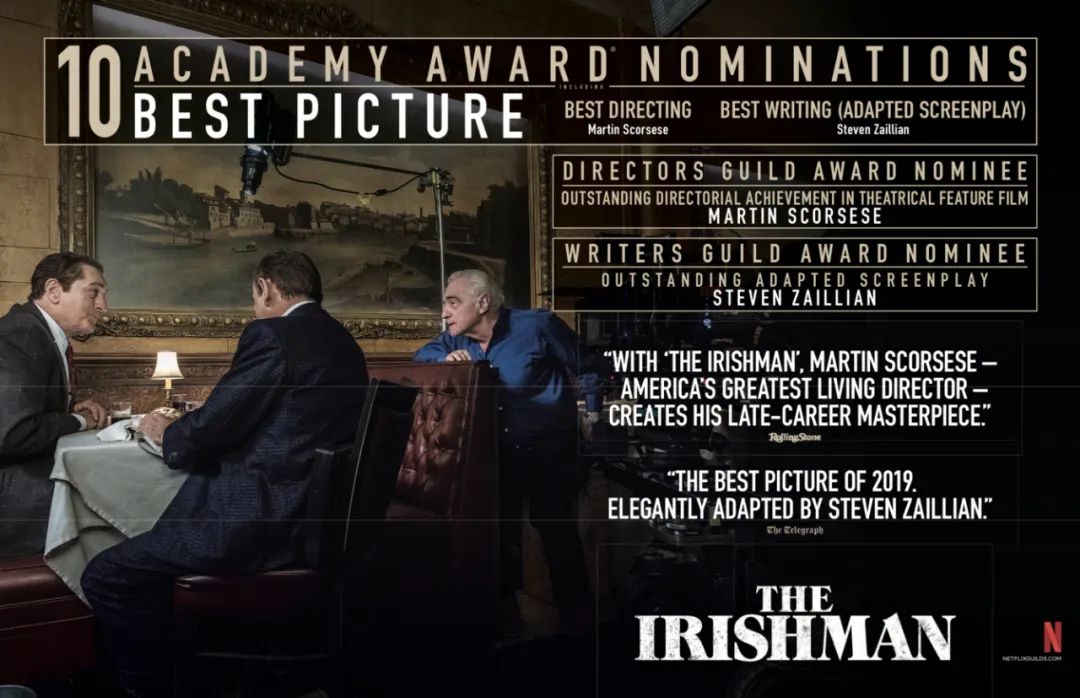
The Irishman poster
Dai Jinhua : Hollywood blockbusters entered China in the 1990s. I have tried to resist. A friend of mine said: Who do you think you are? Do you want to use you as a weight against Hollywood? So what you just said today is global capital, right? Then I knew early on that it was impossible for me to fight them in any sense, let alone change them.
I just sincerely believe that in history not always the strong and mainstream will win. The significance of the persistence of the minority and the minority is not that you overcome something in the end because of your persistence, but because your persistence preserves a possibility. Maybe one day when the mainstream society itself collapses, we will become a choice.
The history of the 20th century has shaped our understanding of movies today, and today's movies also carry the historical energy of the 20th century in a sense. So in this sense, change is absolutely impossible.
And I really look down on Martin Scorsese a little bit. After cursing the Marvel Universe, he took Netflix's money and digitally ruined my favorite movie performance artists: Robert De Niro and Al Pacino, and dewrinkled them so ugly. When you accept Netflix's money, you have sold and betrayed the movie, so don't make any more complaints and criticisms, I think so.

"The Irishman" stills
All the movies in the 2022 Oscar nomination list that are not invested by streaming media are all bad movies on this list, and they are all master movies. In the end, the Oscars gave the award to "Hearing Girl" invested by streaming media-in fact, it still emphasizes a kind of public issues, the social restoration power of movies, and the emotional and empathic abilities of movies.
So I think we should give it a try, defend the theater itself, and let everyone experience the charm of the theater together. I think it is a possibility to defend. I don't need to hypocritically say that I don't watch non-cinema theaters. Of course, some movies are "big-screen movies". I want to watch them on the big screen, but I don't necessarily have the opportunity.
We are just talking about our cognition. This awareness has power in itself. Change is achieved through constant discussion among all of us. As for saying that we have defeated Netflix, or let Netflix become our savior, that is unlikely.

Stills of "Hearing Girl"
Shadan : In fact, you can hardly see streaming movies in film festivals. Because their logic is different. When the power of capital is to promote online and offline simultaneously, it almost gives up movie theaters, including film festivals. Film festivals are increasingly compromising to streaming, but streaming platforms are not compromising to cinemas. I believe and agree with you very much that we want to maintain that kind of life style.
At the same time, I think streaming media is very clear that theaters are its enemy, but the premieres of important works of HBO and, for example, British Film4 are also done in movie theaters. When the greed of capital and emotional confrontation disappear or weaken, I think the possibility of a "reconciliation" still exists.
Beijing International Film Festival invites you to participate in a themed event about Metaverse. In your imagination, what does the Metaverse look like? Can we achieve collective movie watching in the metaverse? Is this in conflict with defending the cinema?

Dai Jinhua : The whole part of my speech at that time was to question why the metaverse became a hot topic in society. The reason why I learned about the concept of the metaverse was that my financial friends kept talking about the metaverse. As a concept stock, it became a hot spot in the stock market. Later, everyone around me was talking about the metaverse, so I felt that I needed to spend some time understanding it.
I first found the science fiction novel "Avalanche"[2]. This book has long been translated into Chinese, but Metaverse was not translated into Metaverse at that time. After reading the novel, I feel that it is not much different from "Ready Player One" [3].
But I noticed a very interesting thing. At least the novel that invented the metaverse and a movie that can be said to have constructed the metaverse have a common premise-a devastating human catastrophe. It was all after the catastrophe that human beings were forced to escape into the metaverse. The metaverse is an escape space, an imaginary space that is different from the real space that is difficult to live in.
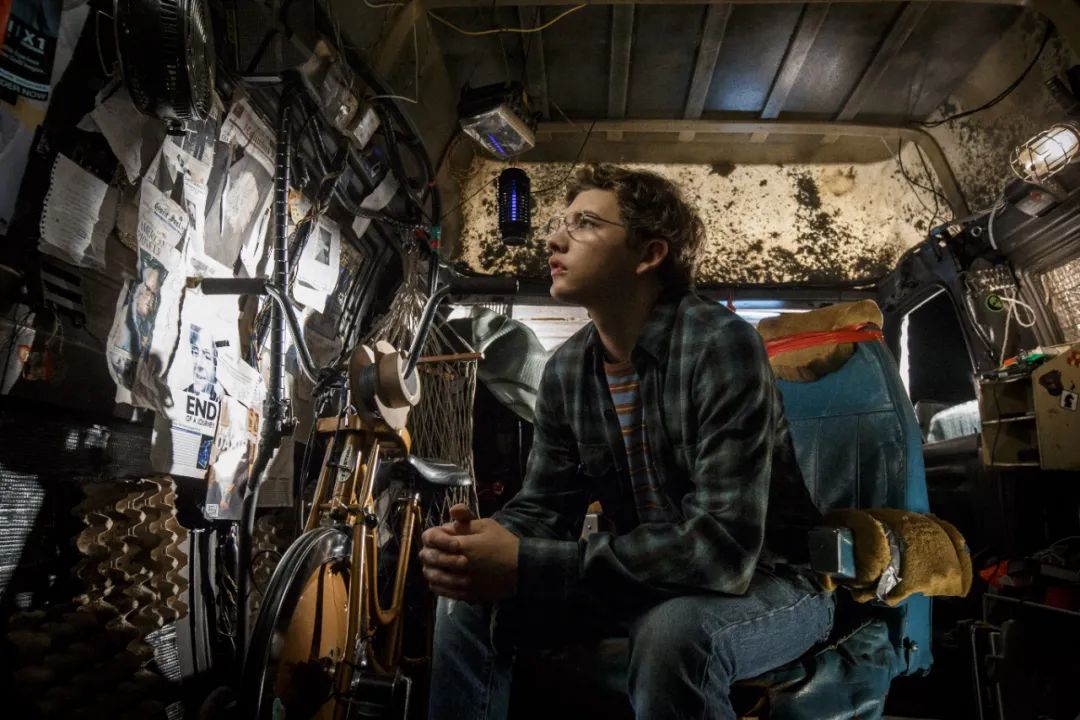
"Ready Player One" stills
The second interesting thing is that we generally believe that the metaverse is a beautiful world for future high-tech development. Some people say that the next most important outlet for young people today is the metaverse, just like the feeling that the Internet gave to our generation. Compared with web2.0, we have made progress and ushered in web3.0. But in fact, a very important thing behind it is the basic point of view of progressivism, developmentalism, and ascensionism-science will bring progress-which is already crumbling but still effective.
I once had an "air dialogue" with Liu Cixin. Liu Cixin's position is that the future direction of human civilization development is the stars, the sea, and the development of outer space. We must go outward. Otherwise, we will use our energy to protect the earth and maintain the earth. Solving the crisis of the earth will only get twice the result with half the effort.
My point is that we have to keep our feet on the earth. Because on the one hand, the stars and the sea are far away, whether it is our aerospace technology today or our understanding of outer space, we are boasting ourselves even if we say a drop in the ocean. Our cognition and imagination of the external world contains a very soothing imagination, that is, if there is a problem with the civilization of the earth, we can emigrate to outer space. "The Wandering Earth" and "Interstellar" are all telling such stories. Can we make it in time? Might we remove most of the billions of Earthlings? I won't expand on too many questions.
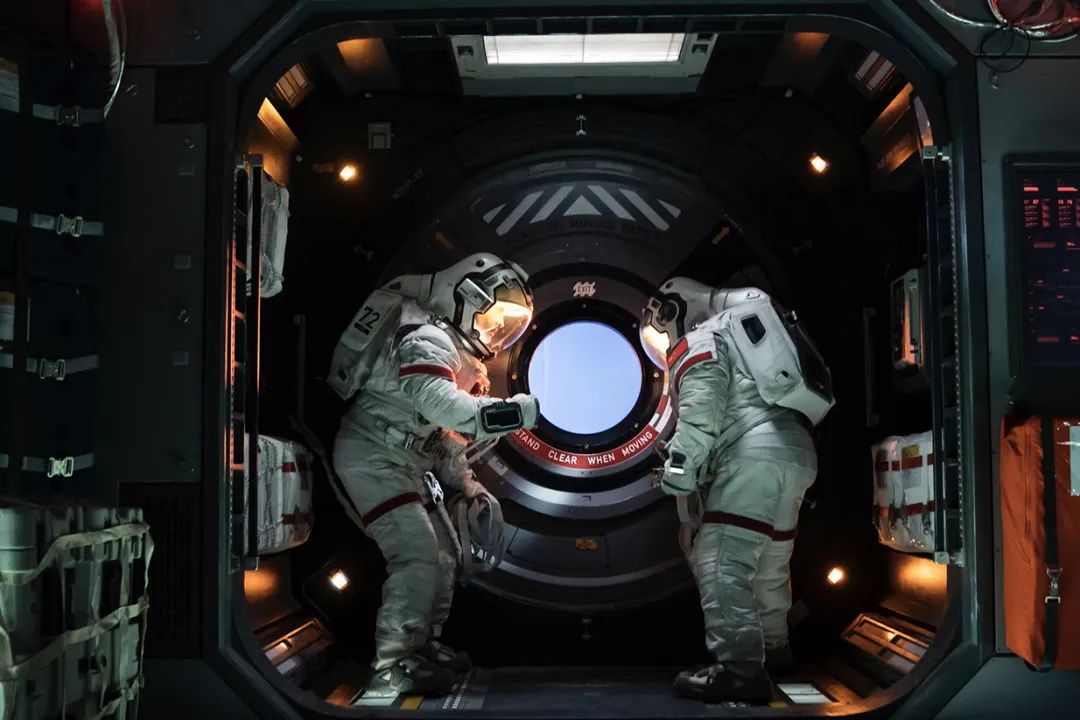
Stills of "The Wandering Earth"
The key for me is whether we talk about the future as a community or as a species. The continuation of the human population is easy to say. I'm not worried about the extinction of humans as a species. But what I care about is the human community. My concern is whether the human majority can survive.
The dialogue at that time made me realize a problem: In the 1980s, Western critical theorists put forward a basic point of view. They believed that the globalization of modern capitalism had been completed in the 1980s, and the entire world had been exhausted. There are only "underdeveloped" and no "undeveloped".
My biggest gain from traveling to the "Third World" is to realize that the "Third World" is not outside the world, and the "Third World" is constructed by this world. This leads to the conclusion that modernism no longer has its "outside". But capitalism without an "outside" is both a triumph of capitalism and a desperate situation for capitalism. Because capitalism needs "external" power to develop infinitely.
Then after the whole world is exhausted, we are left with two possibilities: one is to develop the outer space outward, and the other is to develop the subconscious mind inward. The inner world of human beings is a space that has not been fully developed, which is the true meaning of the metaverse. The Metaverse is a new attempt to exploit and appropriate our subconscious, commodifying our inner and spiritual worlds.
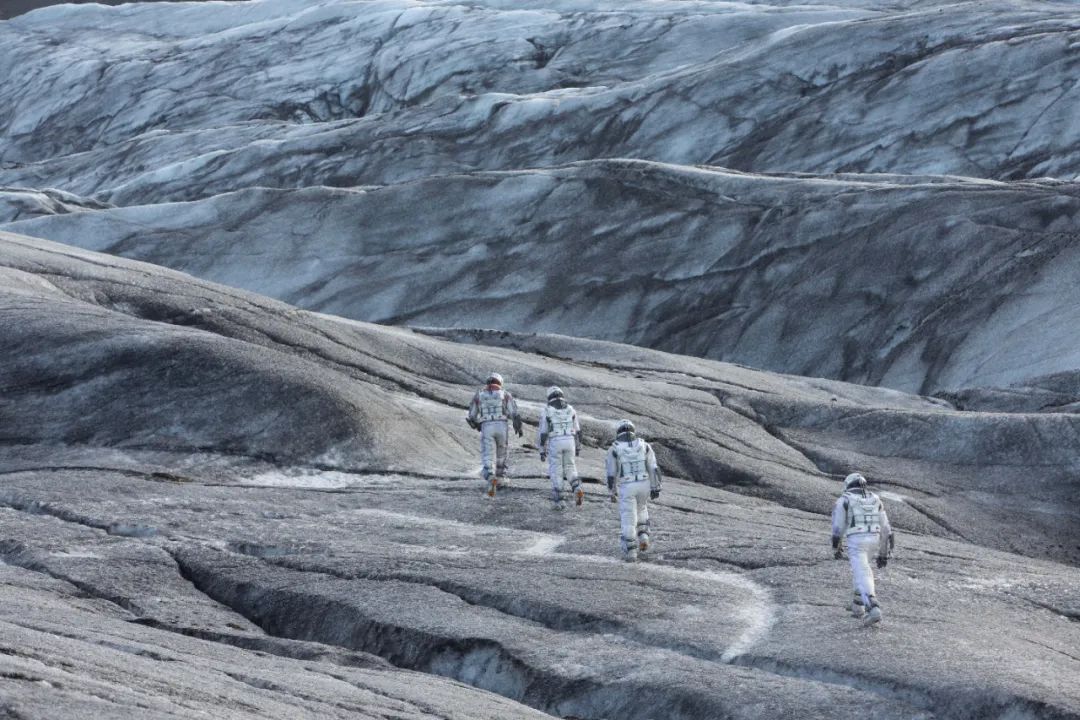
"Interstellar" stills
The doctor I'm reading that book thinks America made psychoanalysis a technique to commodify our inner lives into social control, not Freud himself but the spirit of America analyze.
Then again, the Metaverse is such a logic of inward development, saying that it is the next "outlet" is a lie, but it is also true. This is the direction chosen by capital now, so of course it may become the next "outlet", but when we say it is the next "outlet", it seems to promise that it will be successful, and Metaverse has made a promise.
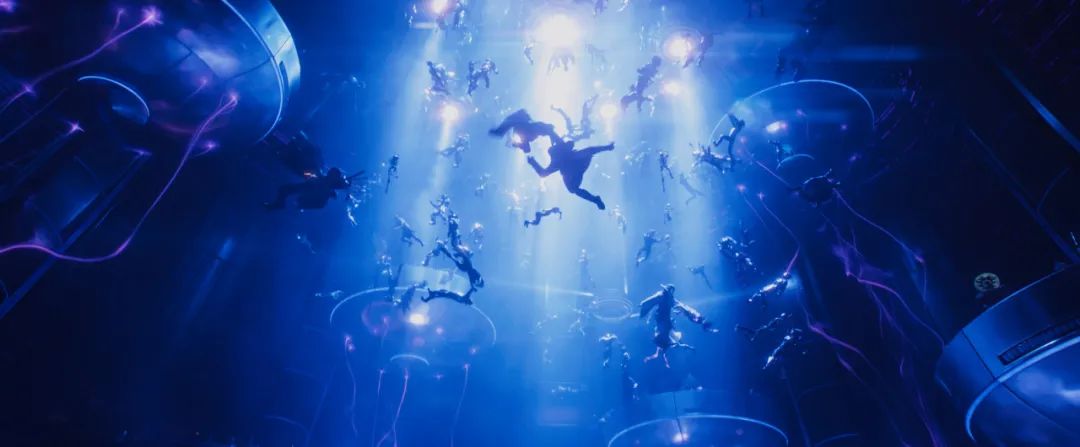
I met a professor who was very optimistic about the future of the Metaverse. The ghost in "Ready Player One" said: After all, we can only have a good meal in reality. He said it's okay, we can save you from coming out to eat, we can feed you.
I think that goes back to the most thorough metaverse movie - "The Matrix". In the movie, our "real body" is soaked in nutrient solution, and then we are controlled by an illusion world shaped by various electronic components. But have you noticed that "The Matrix" did not answer a question: What is the use of people in that era? It seems to answer, it says people are batteries.
But I think there must be a more environmentally friendly and energy-saving power generation method by then, which does not need to raise and manage such a complicated intelligent life as human beings. Perhaps the real problem is that our civilization has indeed reached a height of magnificence that is itself canceling out the full necessity of human existence.

"The Matrix" stills
People who believe in progressivism see the metaverse as another step forward in human civilization. When we firmly believe in such a logic, in fact, the metaverse itself is already "slapping the face".
I just saw two advertisements and news that are generally placed on streaming media. One is the auction of the Metaverse concept car; the other is that the metaverse sea view house has been sold for 300,000 RMB. I can't have 300,000 to buy a sea view house, and I can't buy a concept car.
But this in itself shows that the reality of the metaverse is in the sense of capital operation, and its illusory nature lies in that it cannot change and solve the problems we face in the physical, three-dimensional, material, and physical reality. and dilemma.
This is my general view on the metaverse. The metaverse is based on the premise of a disaster, an escape from reality that cannot survive. Why do we need it today? Do we have a sense of crisis? If we do not have a sense of crisis but a sense of progress, why should we choose the Metaverse for our progress? I probably used a series of questions like this to make my speech, not "embracing" the Metaverse.
··· To be continued...
References
[1] In an interview with "Empire" magazine in October 2019, Martin Scorsese said that Marvel movies are theme parks rather than art movies, and then wrote an article in the "New York Times" in November to further elaborate on his views on Marvel movies. Criticism, pointing out that the occupation of the film market by such films has further marginalized art films. Scorsese's point of view caused an uproar, followed by filmmakers including Ridley Scott and others joined the discussion on this topic, which has affected it to this day.
[2] The novel "Snow Crash" (Snow Crash) published by American science fiction writer Neal Stephenson in 1992 is generally considered to be the first text to put forward the concept of "metaverse".
[3] The 2018 film Ready Player One (Ready Player One) directed by Steven Spielberg is based on the novel of the same name by Ernst Klein.
This article is from the WeChat public account "Muweier" (movie1958). The Paper is reprinted with authorization, please contact "Muweier" for reprinting.


